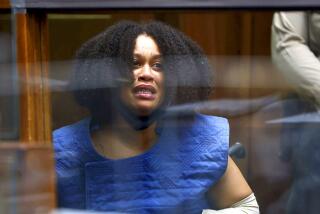Doctor Says Examination Changed His Mind
- Share via
Dr. William P. Cheshire, a Mayo Clinic neurologist and bioethicist, stepped into Terri Schiavo’s hospice room three weeks ago and was overcome by “the distinct sense of the presence of a living human being who seems at some level to be aware of some things around her.”
That was not the reaction he expected before his 90-minute examination of a patient who has spent the last 15 years in a persistent vegetative state, Cheshire wrote in an affidavit filed Wednesday in Florida state court.
Schiavo, he wrote, may have been misdiagnosed. She may not be in a persistent vegetative state, but a recently recognized condition known as a “minimally conscious state,” which encompasses intermittent signs of awareness.
Although the affidavit failed to persuade a state court to intervene in Schiavo’s medical treatment, the seven-page document added fuel to the contentious debate over the 41-year-old woman’s care by providing some scientific validation to those who seek to have her feeding tube reinstated.
“As I looked at Terri and she looked back at me, I asked myself whether I could in good conscience withdraw her feeding and hydration,” Cheshire wrote. “No, I could not.”
A minimally conscious state was defined by the American Academy of Neurology in 2002, a dozen years after Schiavo was first hospitalized.
Though patients in a persistent vegetative state are characterized by a complete absence of awareness, those in a minimally conscious state can respond to pain or the sight of visitors, among other signs of awareness.
Cheshire wrote that Schiavo has not had a complete neurological examination in the last three years and could fall into the minimally conscious category.
Other doctors, however, were skeptical of Cheshire’s assertions. Though he was a respected doctor at a well-known institution, they said he was not a dispassionate evaluator.
“He generally has a reasonably thoughtful, conservative Christian right-to-life perspective,” said David Magnus, co-director of the Stanford University Center of Biomedical Ethics. “He definitely is not a neutral party with respect to these culture wars. He has turf to defend.”
Through a clinic spokesman, Cheshire said he was not available for interviews Wednesday.
Cheshire is director of the Autonomic Reflex Laboratory at the Mayo Clinic in Jacksonville, Fla., which specializes in brain and nervous system disorders.
He is also listed as the director of biotech ethics at the Center for Bioethics and Human Dignity in Bannockburn, Ill., a nonprofit group that, according to its mission statement, addresses issues of managed care, end-of-life treatment, genetic intervention and euthanasia from a Christian perspective.
He was called into the Schiavo case by the Florida Department of Children and Families’ Adult Protective Services, which was seeking custody of Schiavo on grounds that she was the victim of neglect and abuse.
Until Wednesday, the most visible doctor who maintained that Schiavo showed signs of consciousness and should not be allowed to die was Dr. William Hammesfahr, a Tampa-area neurologist who examined Schiavo in 2002.
He was embraced by social conservatives, but Hammesfahr also drew criticism from some neurologists who dismissed him as a self-promoter whose therapies have no basis in medical fact.
Hammesfahr maintains that his critics haven’t taken the time to understand his treatments.
In his affidavit, Cheshire wrote that he came into the case believing that it was “ethically permissible” to withdraw Schiavo’s feeding tube.
But during his evaluation, he began to notice what he interpreted as faint signs of consciousness.
For example, he wrote, “her facial expression brightens and she smiles in response to the voice of familiar persons such as her parents.” When piano music is playing, “she lifts her eyebrows, smiles, and even laughs.”
During Cheshire’s visit to her bedside, she turned her head to look directly at his face, then held his gaze for about 30 seconds, he wrote.
Schiavo cannot speak, but Cheshire wrote that he discerned differences in her monosyllabic utterances, cooing at some points or making guttural sounds when annoyed. These vocalizations could well be signs of “emotional thought within her brain,” he wrote.
He also pointed to a videotape of an examination by Hammesfahr in 2002. Schiavo showed “signs of discomfort” during a test that involved applying a sharp piece of wood to her back.
Later, when Hammesfahr said that he would have to roll her over for another test, Schiavo responded with a grimace and series of crying sounds.
“If Terri is consciously aware of pain, and therefore is capable of suffering, then her diagnosis ... may be tragically mistaken,” he concluded.
But some doctors said that Cheshire’s evaluation was yet another account based on empathy for the patient, not objective clinical fact.
“I think he is clearly biased against declaring her in a persistent vegetative state,” said Dr. Gene Sung, director of the neurocritical care section of USC’s department of neurology, who read Cheshire’s report. “He feels there is something there. That is not a scientific nor medical decision -- it really sounds like it’s a personal feeling. It’s hard to reconcile that with a medical decision.”
Magnus, who also reviewed Cheshire’s affidavit, was concerned that the neurologist based his contention that Schiavo had been misdiagnosed in part on a controversial research paper published last month in the journal Neurobiology.
The research used brain scanning in an attempt to detect mental activity in severely brain damaged patients who had been formally diagnosed as minimally conscious.
The researchers suggested these patients may retain some limited ability to think and respond to the world around them, even though they cannot follow instructions or communicate.
Some experts questioned the researchers’ conclusion because it was based on two patients.
“Any neurologist should be aware of the research’s limitations, unless they were politically motivated,” Magnus said.







